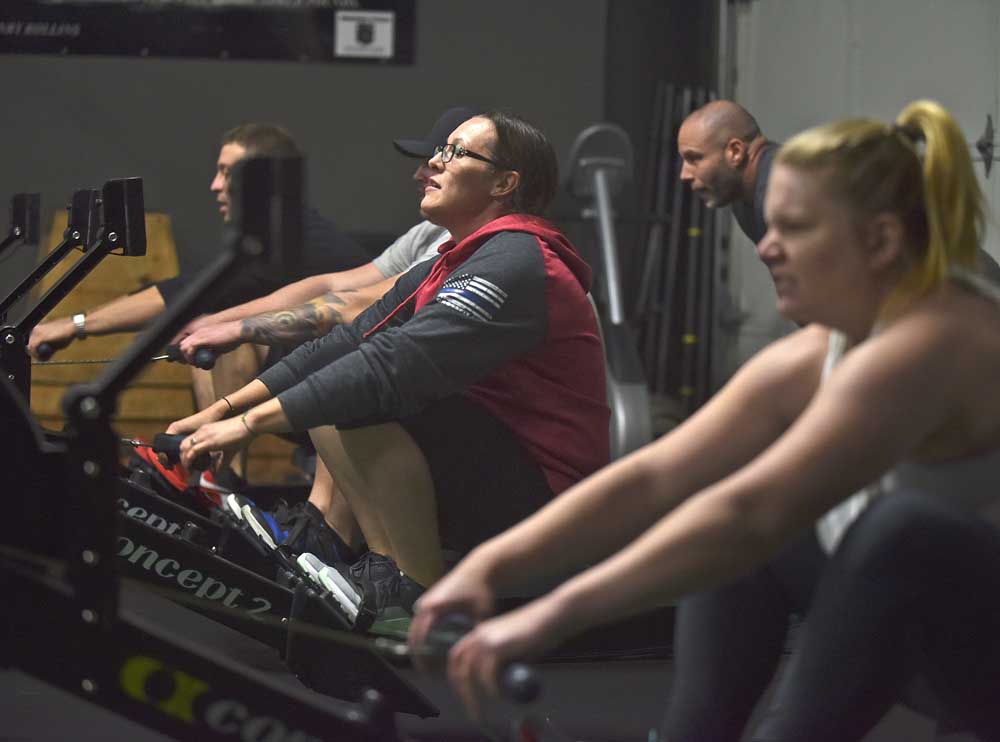‘A new addiction’
Published 3:34 am Wednesday, November 28, 2018

- Students and instructors warm up for the class.
Toni Ramvick was timid at first.
Sure, she used to be an athlete. Some of the 34-year-old’s fondest memories are playing softball and basketball in Knappa. But that was before her life was turned upside down by her addiction to opioids and alcohol.
So when she was referred by Jordan’s Hope for Recovery to try a new CrossFit class designed for recovering addicts, she was naturally cautious.
“I hadn’t been in a gym in years,” she said.
Fast forward one month, and now the Friday night class has become the favorite part of her week.
“I love the feeling of when you’re done with it all … the sense of accomplishment,” she said.
Ramvick is one of a handful of people trying PowerCLEAN — a yearlong pilot program sponsored by the Columbia Pacific Coordinated Care Organization to offer a free, group exercise class to low-income recovering addicts.
Though the program, pitched by David Wray of CrossFit 1811 in Astoria, is geared toward people on the Oregon Health Plan, anyone who is at least 48 hours sober is welcome. Similar programs are rolling out across the country, but it is a first for Clatsop County.
“We were excited about this proposal because it addresses an area of support the community has said they need more of,” said Nancy Knopf, a community health partnership manager at Columbia Pacific CCO. “It’s a very different way of supporting people in recovery.”
Helping recovering addicts has been a lifelong passion project for Wray. As the child of two addicts, he vividly remembers the strain drug abuse put on personal relationships. He reached a tipping point as a teenager after his mother caused and died from a drunken-driving crash.
“I saw what addiction and alcoholism did to my life and wanted to help,” Wray said.
He decided to join law enforcement with a focus on helping people with addiction, working at the Clatsop County Jail for nine years before becoming a parole and probation officer for the county’s drug court.
It was there the glaring need for sober activities became apparent.
“It was hard to recommend my clients to go do a sober activity when there wasn’t much out there,” he said.
Making his gym the sober activity didn’t cross his mind until he and a fellow coach heard about a CrossFit pilot project in St. Helens at an opioids conference. He decided to blend his passion for addiction recovery with his existing business and apply for a wellness grant from Columbia Pacific CCO, which oversees the Oregon Health Plan in Clatsop, Columbia and Tillamook counties.
“When I learned about the PowerCLEAN program I knew it was something our community needed,” he said.
Since the beginning of November, the class has fluctuated from three to nine participants — Wray hopes to get about 20 — and has attracted people of all ages and addictions in varying stages of recovery. Participants mostly come from referrals from drug court or Jordan’s Hope for Recovery, a nonprofit outreach organization.
The class offers something different to everyone. There are the obvious health benefits. For some, it’s learning to get a rush of endorphins from a source other than drugs. For others, it can just give them something to do on a Friday night.
But perhaps one of the most essential things the program offers is variety, said Jenna King, a counselor for Jordan’s Hope for Recovery who runs the mental health and wellness portion of the class.
“You have it crammed down your throat — ‘Let’s go to meetings!’” King said. “Which is great. But it’s also helpful having something additional to do in the community. Some people are just trying to fill their time to not drink and use.”
The community atmosphere CrossFit provides is also conducive to recovery, Wray said. Each exercise is done as a group endeavor. There is no hierarchy of ability — anything can be modified, everyone starts together, and everyone finishes together.
“CrossFit can be intimidating for people,” Wray said, referring to the professional CrossFit games people associate with the discipline. “But CrossFit is really more about community and overall health rather than raising elite athletes.”
Whatever the reason, it keeps participants like Ramvick coming back.
“You feel like it’s a new addiction,” Ramvick said. “But a positive addiction.”





